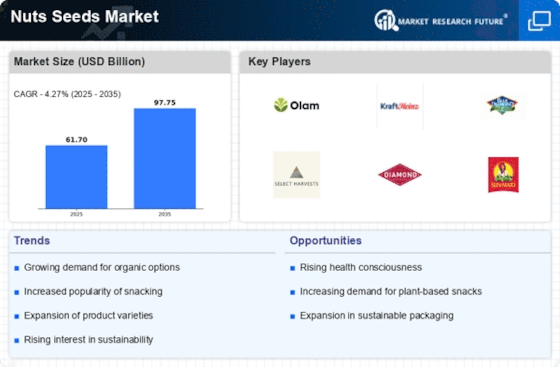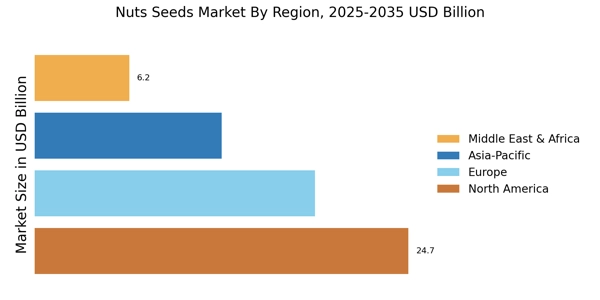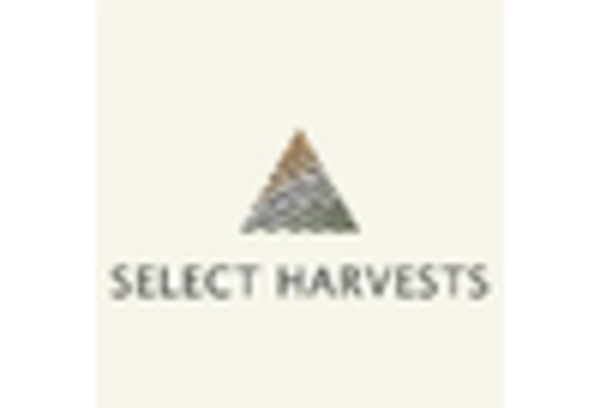Innovations in Product Offerings
Innovations in product offerings within the Nuts Seeds Market are driving consumer interest and expanding market reach. Companies are increasingly introducing flavored, roasted, and mixed varieties of nuts and seeds to cater to diverse taste preferences. Additionally, the development of convenient packaging solutions, such as single-serve packs, enhances accessibility for on-the-go consumers. The introduction of organic and non-GMO options also aligns with the growing demand for clean-label products. As of 2025, the market is expected to witness a compound annual growth rate of around 5%, driven by these innovative offerings. This trend not only attracts new customers but also encourages existing consumers to explore different products, thereby broadening the overall market.
Health Benefits of Nuts and Seeds
The increasing awareness of health benefits associated with nuts and seeds is a primary driver in the Nuts Seeds Market. These products are rich in essential nutrients, including proteins, healthy fats, vitamins, and minerals. Research indicates that regular consumption of nuts and seeds can reduce the risk of chronic diseases such as heart disease and diabetes. In 2025, the market for nuts and seeds is projected to reach approximately 50 billion USD, reflecting a growing consumer preference for healthy snacking options. This trend is further supported by the rise in plant-based diets, as more individuals seek nutritious alternatives to traditional snacks. Consequently, the demand for nuts and seeds continues to surge, positioning them as a staple in health-conscious diets.
E-commerce and Online Retail Growth
The growth of e-commerce and online retail is transforming the Nuts Seeds Market. With the increasing penetration of the internet and mobile devices, consumers are increasingly turning to online platforms for their shopping needs. This shift has led to a surge in online sales of nuts and seeds, as consumers appreciate the convenience and variety offered by e-commerce. In 2025, online sales are projected to account for a significant portion of the overall market, driven by the rise of health-conscious consumers seeking easy access to nutritious snacks. Retailers are also investing in digital marketing strategies to reach a broader audience, further fueling this trend. As a result, the Nuts Seeds Market is likely to experience substantial growth through online channels.
Sustainability and Ethical Sourcing
Sustainability and ethical sourcing practices are becoming increasingly important in the Nuts Seeds Market. Consumers are more aware of the environmental impact of their food choices and are seeking products that align with their values. This has led to a growing preference for sustainably sourced nuts and seeds, which are produced with minimal environmental impact. Companies that prioritize ethical sourcing and transparent supply chains are likely to gain a competitive edge in the market. As of 2025, the emphasis on sustainability is expected to drive market growth, with consumers willing to pay a premium for products that meet these criteria. This trend not only benefits the environment but also enhances brand loyalty among conscious consumers.
Rising Demand for Plant-Based Proteins
The rising demand for plant-based proteins is significantly influencing the Nuts Seeds Market. As consumers increasingly shift towards vegetarian and vegan diets, nuts and seeds are recognized as excellent sources of protein. This trend is particularly evident among younger demographics, who are more inclined to adopt sustainable eating habits. In 2025, the plant-based protein market is anticipated to grow substantially, with nuts and seeds playing a crucial role in this expansion. The versatility of these products allows them to be incorporated into various meals, snacks, and beverages, further driving their popularity. Consequently, the demand for nuts and seeds is expected to rise, reflecting a broader shift towards plant-based nutrition.

















